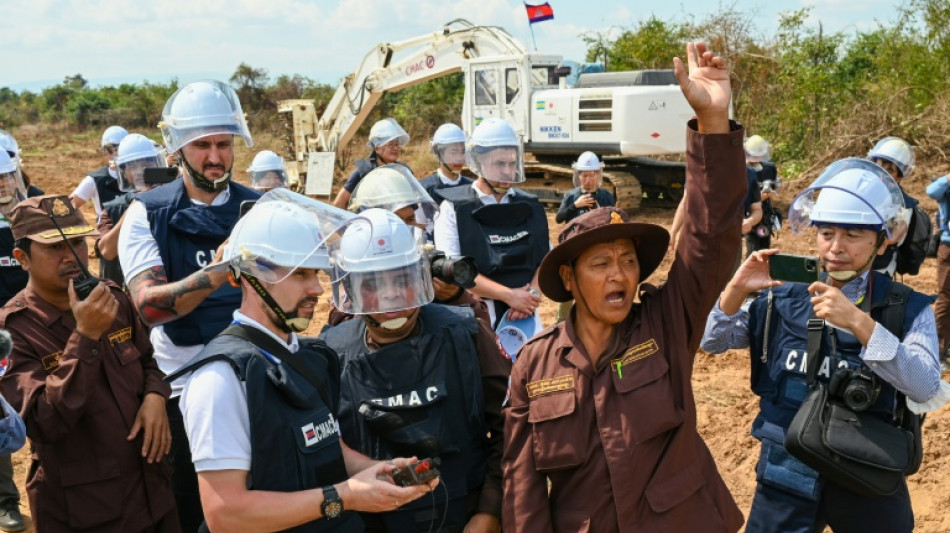
-
 Ovechkin first to score 900 NHL goals as Capitals beat Blues
Ovechkin first to score 900 NHL goals as Capitals beat Blues
-
On Mexico City's streets, vendors fight to make it to World Cup
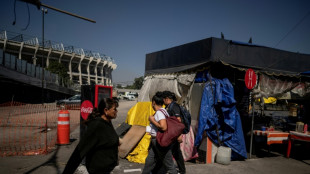
-
 Asian markets bounce from selloff as US jobs beat forecasts
Asian markets bounce from selloff as US jobs beat forecasts
-
Philippine death toll tops 140 as typhoon heads towards Vietnam
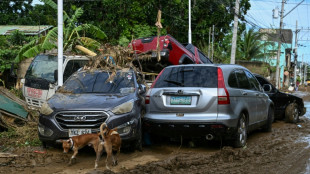
-
 Kyrgios targets 'miracle' Australian Open return after knee improves
Kyrgios targets 'miracle' Australian Open return after knee improves
-
'AI president': Trump deepfakes glorify himself, trash rivals

-
 Belgium probes drone sightings after flights halted overnight
Belgium probes drone sightings after flights halted overnight
-
Five things to know about 'forest COP' host city Belem
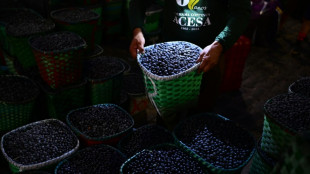
-
 World leaders to rally climate fight ahead of Amazon summit
World leaders to rally climate fight ahead of Amazon summit
-
Engine fell off US cargo plane before deadly crash: officials

-
 Mexican leader calls for tougher sexual harassment laws after attack
Mexican leader calls for tougher sexual harassment laws after attack
-
Meghan Markle set for big screen return: reports

-
 Japan deploys troops after wave of deadly bear attacks
Japan deploys troops after wave of deadly bear attacks
-
FIFA announce new peace prize to be awarded at World Cup draw in Washington

-
 Australia's Cummins hints at return for second Ashes Test
Australia's Cummins hints at return for second Ashes Test
-
Boeing settles with one plaintiff in 737 MAX crash trial
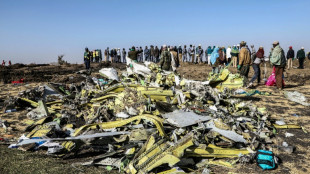
-
 Man City win as Inter stay perfect, Barca held in Champions League
Man City win as Inter stay perfect, Barca held in Champions League
-
French superstar DJ Snake wants new album to 'build bridges'

-
 Barca rescue draw at Club Brugge in six-goal thriller
Barca rescue draw at Club Brugge in six-goal thriller
-
Foden hits top form as Man City thrash Dortmund

-
 NBA officials brief Congress committee over gambling probe
NBA officials brief Congress committee over gambling probe
-
Inter beat Kairat Almaty to maintain Champions League perfection

-
 Newcastle sink Bilbao to extend Champions League winning run
Newcastle sink Bilbao to extend Champions League winning run
-
Wall Street stocks rebound after positive jobs data

-
 LPGA, European tour partner with Saudis for new Vegas event
LPGA, European tour partner with Saudis for new Vegas event
-
Eyes turn to space to feed power-hungry data centers

-
 Jazz lose Kessler for season with shoulder injury
Jazz lose Kessler for season with shoulder injury
-
League scoring leader Messi among MLS Best XI squad

-
 MLS bans Suarez for Miami's winner-take-all playoff match
MLS bans Suarez for Miami's winner-take-all playoff match
-
McIlroy appreciates PGA of America apology for Ryder Cup abuse

-
 Garnacho equaliser saves Chelsea in Qarabag draw
Garnacho equaliser saves Chelsea in Qarabag draw
-
Promotions lift McDonald's sales in tricky consumer market

-
 Five things to know about New York's new mayor
Five things to know about New York's new mayor
-
Anisimova beats Swiatek to reach WTA Finals last four

-
 US Supreme Court appears skeptical of Trump tariff legality
US Supreme Court appears skeptical of Trump tariff legality
-
AC Milan post third straight annual profit on day of San Siro purchase

-
 Angelina Jolie visits Ukrainian frontline city, media reports say
Angelina Jolie visits Ukrainian frontline city, media reports say
-
UN says forests should form key plank of COP30

-
 Star designer Rousteing quits fashion group Balmain
Star designer Rousteing quits fashion group Balmain
-
Mexico's Sheinbaum steps up cartel fight after murder of anti-narco mayor
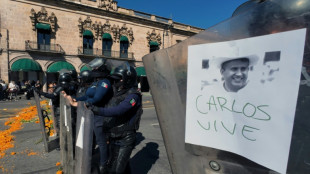
-
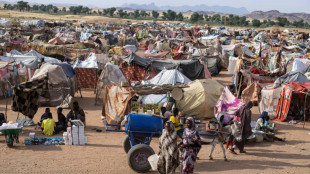 Attack on funeral in Sudan's Kordofan region kills 40: UN
Attack on funeral in Sudan's Kordofan region kills 40: UN
-
Key PSG trio set for spell on sidelines

-
 Democrats punch back in US elections - and see hope for 2026
Democrats punch back in US elections - and see hope for 2026
-
BMW reports rising profitability, shares jump

-
 Bolivia Supreme Court orders release of jailed ex-president Jeanine Anez
Bolivia Supreme Court orders release of jailed ex-president Jeanine Anez
-
Wall Street stocks rise after positive jobs data

-
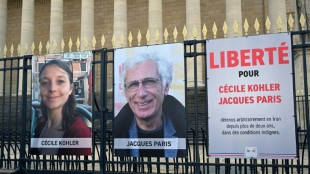 'Hostage diplomacy': longstanding Iran tactic presenting dilemma for West
'Hostage diplomacy': longstanding Iran tactic presenting dilemma for West
-
Rybakina stays perfect at WTA Finals with win over alternate Alexandrova

-
 Le Garrec welcomes Dupont help in training for Springboks showdown
Le Garrec welcomes Dupont help in training for Springboks showdown
-
Brussels wants high-speed rail linking EU capitals by 2040


Ukrainian deminers learn from decades of Cambodian experience
The baking sun beating down on them, a group of Ukrainian deminers watched intently as their Cambodian trainers swept through a dusty field in eastern Battambang province on Thursday, seeking to learn from decades of bitter experience.
Cambodia is among the most heavily mined countries in the world, following 30 years of civil war which ended in 1998, with clearance work continuing to this day.
The group of 15 Ukrainians is in the country for a week of training on how to use demining tools such as detectors, specialised machinery, and animals trained to sniff out the weapons and other unexploded ordnance.
Wearing white hard hats, protective body gear and clear plastic visors, the Ukrainians walked gingerly through a field littered with bright red warning signs demarcating danger zones.
Ahead of them, Cambodian officials scanned the ground with olive-green wands, an urgent beeping sound accompanying each sweep.
In December, Ukrainian President Volodymyr Zelensky called for long-term help in clearing his war-ravaged nation of mines and other unexploded ordnance, which he said now cover an area roughly the size of Cambodia.
Ukrainian Captain Arsenii Diadchenko said the Cambodians' technical skills and expertise would help to prevent more deaths in his country.
"(The training) will be very helpful to clear our territory from Russian mines and Russian (unexploded ordnance)," he told reporters.
"It will help them and their families to be safe."
- 'We think differently' -
The use of anti-personnel landmines, designed specifically for use against humans, is prohibited under a 1997 international convention signed by more than 130 countries. Russia has not acceded to the convention.
Russian troops have used at least seven types of landmines in Ukraine since the invasion, according to Human Rights Watch.
Even before the invasion, a 2019 United Nations report said that eastern Ukraine was among the most mined areas in the world.
The training was organised by the Japanese government, in conjunction with the Cambodian Mine Action Center (CMAC).
Oum Phumro, deputy director of the centre, said the training would be ongoing.
"In Cambodia, we train them for one week and then we continue training them via online and preparing procedures for demining in Ukraine," he told reporters.
Cambodia will send a team of up to four instructors to Poland to further train Ukrainian deminers later this year, he added.
Almost 20,000 Cambodians have been killed by landmines, with around 45,000 people wounded, according to a 2019 report from an international munitions monitoring group.
CMAC deminers have destroyed more than half a million mines in the past two decades.
The kingdom aims to be landmine free by 2025, although efforts to clear the remaining 716 square kilometres –- an area roughly the size of Kyiv -– have hit funding snags.
As well as metal detectors, Cambodia has used an elite squad of specially trained African-bred rats to sniff out landmines in recent years.
After the field demonstration, the Ukrainians met with some of the victims of those landmines from nearby villages, to learn about their experiences.
Phumro said there was criticism for resources being spent on demining during an active conflict, but he nonetheless felt the work was vital.
"We think differently, because the sooner we start demining, the better," he said.
"Because people need to return to their homeland, need land, and need to walk through the affected areas."
F.Pavlenko--BTB




